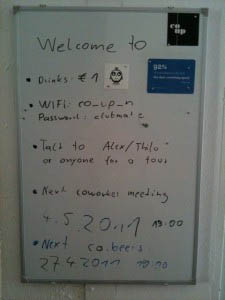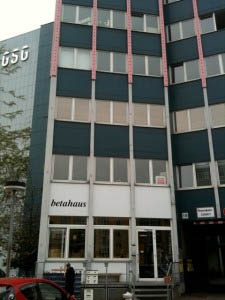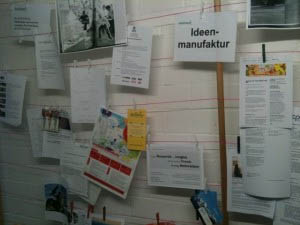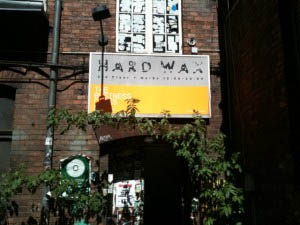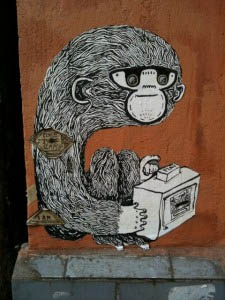I was aware of a few co-working spaces in the North of England, but sad to hear that Fly The Coop – based in the centre of Manchester – had recently closed – and wanted to explore a number of different spaces elsewhere. From looking on Desk Wanted [http://www.deskwanted.com ] – an online, worldwide directory of co working spaces it seems that the majority of spaces in each country are located in the capital city. Not necessarily particularly surprising, but I am surprised there are not more co-working spaces in metropolitan cities such as Manchester – especially as there’s such a big tech scene there. I can only find reference to one more Manchester coworking space – Open Space in Hulme [http://www.openspace.coop/ ] – which is run as a member’s co-operative as well as offering coworking spaces in their shared office.
Coworking spaces in Berlin
co.up [ http://co-up.de/ ]
The first coworking space I visited in Berlin was co.up – situated on the third storey of a factory / office block. The atmosphere was lovely, and after a quick introduction by Thilo + Alex I was made to feel very welcome. I could have grabbed a desk but decided to work from one of the comfy sofas in the informal chill out room.As well as holding regular events such as the Berlin Processing user group, and up.front.ug user group, co.up also has regular informal ‘co.beers’ – a chance for the freelancers based there to chill out, have a chat about what they’re up to and spend some time together, meet new members, etc. It just so happened that I had turned up on a co.beers day, so ended up meeting + chatting with most of the people who were there.
Betahaus [ http://betahaus.de ]
Offering more than traditional ‘hot desk’ coworking space – the betahaus was a great place to visit. Spread over 3 floors there is a real mix of different activities and spaces here. On the ground floor there is a big, airy cafe selling food + drinks, and also a workshop space with hand tools, a 3D printer and space to make things and store materials. The first floor is dedicated to freelancers and ‘hot deskers’ and the second floor has fixed desks and small offices for startups / small businesses.
Having different spaces encourages more variety in the type of work people can do in a venue – it seems that coworking spaces are traditionally occupied by people who can do most of their work on a laptop – which makes sense – but the addition of a workshop or specialised equipment may draw others to a space, creating different opportunities for collaboration.
One thing that caught my eye at the betahaus was the ‘Skype booth’ – essentially a small cupboard with a light that people could go in for a bit of privacy when making Skype or phone calls. There seemed to be quite a nice ‘funky’ / playful approach to how the coworking space was laid out in general, including some great chill out / social areas alongside the more ‘office-y’ bits.
Like co.up BCN-Berlin seemed mostly occupied by laptop based workers – not only freelancers but small companies / groups of people working together. It turns out that Deskmag – the online coworking magazine that conducted the recent global coworking survey – were based at BCN-Berlin and so I had a good long chat with them – thanks guys!
I found out about The Wostel coworking space from Kriesse [ http://kristinaschneider.com/ ] [thanks Kriesse]- a member of the co.up coworking space. The Wostel is a fairly new coworking space with small but very stylish and well formed rooms for coworkers. Similar to the betahaus in that there were separate rooms for hot deskers and fixed desk / small office space – but different in scale and style – there was more retro and antique furniture here compared to the very modern feel of the betahaus.
I spoke with Chuente – one of the founders – and she said that they were trying to create a particular feel and atmosphere for the Wostel that was different to the other coworking spaces in Berlin – and I think they’ve done a great job. Big communities and open spaces aren’t for everybody – and The Wostel is an example of how a smaller coworking space can be the right place for some people. Despite being relatively small The Wostel still holds events and shows including the lovely sounding ‘Kreativ-Speeddating’.
Thoughts
I think a good balance may be splitting your working time between a coworking space and other places, perhaps a coffee shop, a library or maybe staying at home if you need to really focus and have some quiet time. Of course we all have our own needs and demands and should be able to determine what we want – especially as freelancers – but I would encourage anybody to try coworking, even if it’s only for a short time period. Many coworking spaces offer a free trial, or very short term contracts meaning you can get out if it’s not for you.
Each coworking space has it’s own identity, ways of doing things and differences that may suit some people more than others. If you have had a bad experience or don’t like one coworking space there’s a chance that another may suit you down to the ground.
Despite the majority of coworkers being self employed, freelance or part of a small startup company I think there may be ways of full time employees of larger or more established companies taking advantage of coworking spaces. There are some examples of larger companies allowing their employees to spend some time at coworking spaces – as a way of getting to know talent outside of the company as well as having a break from their usual office environment.
I am curious as to how an organisation that is used to having a full time office would fare without it; relying solely upon time at coworking spaces and working from home. I have yet to come across any companies that have downsized, or changed their operations in this way. My next post will look at what needs to be thought about and tackled if a company did want to get rid of their permanent office and make more use of coworking spaces.
Interesting links
http://gigaom.com/collaboration/coworking-101-a-brief-history/
http://www.deskmag.com/en/the-average-cost-of-coworking-spaces-survey-218

